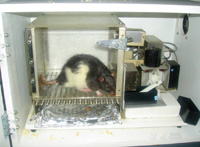
When I first started digging into addiction research, a study called Rat Park was one of the most interesting things I found. In short, the researchers suspected there was something wrong with putting a rat in a tiny cage with tubes sticking into its body to deliver drugs, and concluding that drugs were in fact addictive because the rats were apt to press a lever to get the drugs.
The Rat Park researchers set up an alternative scenario – an open space where rats could be rats, not be isolated, and have more options than just pressing a lever for food or drugs. The results were that the rats who weren’t isolated in a skinner box took far less drugs – thus challenging the entire addiction paradigm. Here’s an excerpt from an updated discussion of the experiment, and a link to the full article follows:

At this point, it is too early to say conclusively if the Rat Park view of addiction is right or not, but it is not too early to be sure that the old theory that addiction is a problem caused by addictive drugs is far too simple. Huge amounts of research money have been spent researching the idea that addictive drugs are the cause of addiction and treatments based on that idea have been tried over the world. In the meantime, the once-small problem of addiction has globalized. Moreover, it has become absolutely clear that drug and alcohol addiction is only a corner of a much larger addiction problem!
Full Story: Addiction: The View From Rat Park

1 comment
Comments are closed.